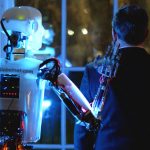 The past few months have seen a deluge of dire warnings about the coming robotic apocalypse, whereby vast swathes of jobs will be automated and humanity will be sidelined by our new robotic overlords.
The past few months have seen a deluge of dire warnings about the coming robotic apocalypse, whereby vast swathes of jobs will be automated and humanity will be sidelined by our new robotic overlords.
Most of these dire predictions have their basis in three prominent studies. The first, and arguably most well known, was published by Oxford University’s Michael Osborne and Carl Benedikt Frey back in 2013. In it, they argue that 47% of jobs will be automated within 20 years.
The second was published by the McKinsey Global Institute, and they predicted that 45% of jobs will be automated, whilst a third, by PwC toned things down a bit and suggested just 38% of jobs will go by 2030.
Shaky ground
Dire stuff, and they’ve each been used as props for a huge number of doomsday laden articles. The thing is, the basis for the predictions in each study is flimsy. The Oxford paper simply looked at Department of Labor assessments of occupations for various factors, such as the amount of manual dexterity required, and extrapolated a risk factor from that assessment. If the risk was high, the job was deemed ripe for automation.
The McKinsey work admitted that just 5% of jobs are likely to be fully automated, but that 45% of an employees time could be saved via automation. A subtle yet very important difference, as we must surely presume that employees can do numerous other things to occupy that newly saved time.
The PwC study also has a number of structural flaws, not least in the way it believes both the price and functionality of automated technologies will improve significantly.
New territory?
Such articles are compounded by the fact that they have very little historical basis for their projections. One analysis, by Deloitte, suggested that between 2001-2015, some 800,000 jobs were automated, which is bad, except technology also helped to create 3.5 million new jobs during the same period.
Indeed, a recent paper highlighted the minimal impact technology has had on the amount of jobs created in recent economic recoveries, with the analysis having been performed over a few centuries rather than a decade.
What do executives think? Workforce solutions company Adecco recently asked 1,000 senior leaders what they thought the impact of technology would be on the workplace. Most were overwhelmingly optimistic.
For instance, the majority thought that technology will not only make jobs easier, it will also take away many of the mundane tasks we have to perform, thus freeing us up for more enjoyable work. What’s more, in terms of job displacement, 65% of respondents thought that technology had increased the number of jobs available, with the majority believing this trend will continue into the future.
“Far from the widespread fear that automation will make employees redundant, our research shows that the workplace of the future could create opportunities for more flexible and fulfilling work. Many organisations and employees are buying into the idea of flexible working, but struggling to implement the reality. Our research suggests that robots could be a significant part of the solution,” Adecco say.
Who will be right? I suppose only time will tell.